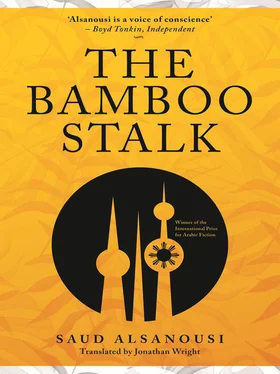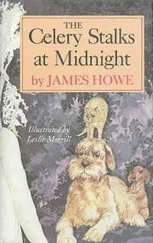She looked at me with tears in her eyes. ‘He didn’t have a father,’ she said. The words were like a slap in the face.
The bee in my head stopped. The buzzing disappeared. I closed my eyes and tried to detect it but it had left my head to join a hive of other bees, in Mendoza’s head.
11
Six months after Ghassan’s first phone call, and after months of bureaucracy, I finally picked up my passport from the Kuwaiti embassy in Manila. I went straight from the embassy to the cathedral. Now that I was certain to be travelling, I felt confused and afraid of the unknown.
In the cathedral I sat in the front row. I put my hand on the cross hanging round my neck, the one Mama Aida had given me after my confirmation ceremony years earlier. I started to pray: ‘Our Father who art in Heaven, Hallowed be thy name; Thy kingdom come, Thy will be done, On earth as it is in heaven. Give us this day our daily bread; And forgive us our trespasses, As we forgive those who trespass against us; And lead us not into temptation, But deliver us from evil. Amen.
‘Our Father, I am going back to where I was born, to the land of the father I have never known, to a destiny known only to You. My mother says a beautiful life awaits me there but no one but You knows what really awaits me. Our Father who art in Heaven, in my hand I have a blue passport and in my heart I have a faith I fear I may not be able to preserve. Help me to believe in You. Abide with me on my journey. Guide me to what is good and dispel my doubts. Our Father who art in Heaven, are You really in Heaven? Answer me, in the name of Your angels and in the name of Your son the Messiah and of the Virgin.’
* * *
From the cathedral I walked towards Chinatown as far as the Seng Guan Temple. It took me two hours, mostly on foot, simply because I wanted to walk among ordinary people in Manila one last time, breathing in the thick exhaust fumes and trying to look at the sun, which doesn’t look like the sun in Kuwait, and looking at the trees on the sides of the street, with their branches hanging heavy with fruit. I looked into the faces of the people around me and missed them even before I had left them. I wanted to apologise to them all, saying that despite the years I had spent amongst them I did not belong with them.
I stopped three quarters of the way from the cathedral to the temple. I felt tired. I hailed a taxi. ‘To the Seng Guan Temple, please,’ I said.
The driver was surprised. ‘It’s very close to here,’ he said, pointing towards it.
‘I know, but will you take me?’ I replied.
The traffic was heavy and I would have arrived sooner if I had carried on walking to the temple. In the taxi I could see out of the window on my left and through the front window. I saw things as if I were looking at them for the first time. I was finding it hard to breathe, maybe because of all the traffic around me, or maybe because of the tangle of emotions that I felt. I could see misery in many of its guises through the taxi window: the misery on the faces of the vendors, the dirty clothes, the child beggars following anyone who looked clean, the Muslim boys in their caps that had once been white, offering pirated DVDs of pornography and the most popular Hollywood films. On the pavements there were people with carts selling bananas, including Cheng. He looked happy. People were crowding around his cart as though there were a festival on. Yellow and blue were the colours around him: the yellow of the bananas and the blue of his plastic bags.
The driver had a wooden crucifix hanging on a chain from the rear-view mirror, and behind the steering wheel there was a little statue of the Buddha sitting cross-legged with prayer beads in his hand.
‘Why do you have the cross?’ I asked the driver.
He turned and looked at me suspiciously. ‘Because I’m Christian,’ he said.
‘And why the other statue?’ I asked, looking at the Buddha.
He smiled, as if he knew what I was driving at. ‘It brings in business,’ he said.
The taxi stopped outside the Seng Guan Temple and I started to get out. ‘I see you have a cross around your neck. Why?’ the driver said.
I opened the door and got out. ‘It’s something my aunt chose for me,’ I said with a smile.
He pointed to the temple gate and smiled broadly. ‘And Seng Guan, why?’ he asked.
While he waited for me to answer, I closed the taxi door and turned my back on him. But I could hear him through the window. ’Hey!’ he said. ‘I answered you when you asked me a question.’
I kept walking towards the temple gate. ‘Hey, be fair!’ the driver shouted. ‘Why?’
I stopped at the gate and turned to face the taxi. The man was still waiting for me to reply. I looked up and scratched my head to indicate I was trying to think of an answer. ‘It does something for me, but I don’t know what it is,’ I said.
* * *
I stood in front of the glass enclosure in the middle, where there was a golden statue of the Buddha standing. There was a man with prayer beads sitting on one of the low cushions and there was an old woman standing in front of the glass enclosure in the middle praying devoutly. I stood next to her, facing the Buddha statue.
‘Buddha, I don’t know how to pray to you. But if you really are the one who will save mankind from its ordeals and afflictions, then you will hear me and accept my prayer as it is. I don’t know how to pray with prayer beads like the man sitting over there. I don’t see the need to put my hands together and move them up and down in front of your statue like that old woman next to me. But I know how to light an incense stick and plant it in the bowl of soft sand, even if I don’t know why I’m doing it. Help me to believe in you, in your message, your disciples and your virgin mother, Maya, who bore you inside her on the day when her womb radiated light and you were visible inside it before you were born. If you are a god, a prophet or a saint, guide me, be my helper so that, through you, I can see the light.’
PART 4. Isa. . The Second Wandering
‘The tyranny of some is possible only through the cowardice of others.’
José Rizal
1
Kuwait airport looked very gloomy when the plane landed on Sunday, 15 January 2006. People’s faces were much the same — gloomy in a way for which I could see no justification. The passengers formed lines in front of the immigration officers who stamped their passports. There were signs above the front of each line, some of them saying GCC Citizens and others saying Citizens of Other Countries . I stood there, uncertain which line to stand in. Should I go to the line where the Filipinos from my flight were standing? Or the line with the people who didn’t look like me?
Under a No Smoking sign attached to one of the columns, a man in military uniform was standing, leaning against the column. I went up to him and asked him which line I should stand in. ‘Sir,’ I said, ‘does GCC Citizens include Kuwaitis?’
He threw his cigarette on the floor and crushed it with his boot. He spread his arms, shook his head and said, ‘No English.’ I went over to where they were stamping passports, carrying my briefcase of valuables: old pictures of my father and my identity papers. I stood in one of the GCC lines behind men wearing loose gowns and Arab headgear. They must be Kuwaitis like me , I thought.
The officer stamped their passports one by one until my turn came. I put my hand in my trouser pocket but before I could take out my passport the officer shouted at me so rudely I was shocked. He waved me towards the other line, where the Filipinos and people of other nationalities were standing. He said something I didn’t understand. I hurried to the other line, while the officer went on talking loudly and pointed at the sign above him. He sounded angry. Then he pointed a finger at his ear and made that gesture that meant he thought I was crazy. I was shaking and people were looking at me. Was it forbidden to stand in that line? Was it a military zone?
Читать дальше












